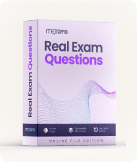ACFE CFE - Law - Certified Fraud Examiner - Law Exam
Page: 2 / 31
Total 153 questions
Question #6 (Topic: Exam A)
Which of the following examples of judicial systems would best be described as a civil law system?
A. The courts are bound primarily by previous court decisions to resolve legal issues.
B. The courts are bound by both previous court decisions and codified principles or statutes.
C. The courts are allowed to consider both codified statutes and previous court decisions but are bound by neither.
D. The courts are bound by codified principles or statutes but are not bound by previous court decisions.
Answer: D
Question #7 (Topic: Exam A)
Which of the following is an example of a trade-based money laundering scheme?
A. An accountant overstates a restaurant's revenues to hide illegal funds that are secretly laundered through the business.
B. A drug cartel outside of the United States launders illicit funds by hiring runners to deposit small amounts of money in bank accounts throughout the United States.
C. An importer and an exporter conspire to conceal illicit funds by creating invoices that understate the quantity of goods shipped internationally.
D. A businessperson deposits illicit funds into the bank account of a company they secretly own, which then lends the funds back to them.
Answer: C
Question #8 (Topic: Exam A)
Raj is an employee who works in a jurisdiction that prohibits unreasonable workplace searches and surveillance in areas or items where employees have a reasonable expectation of privacy. In which of the following is Raj MOST LIKELY to have a reasonable expectation of privacy?
A. A filing cabinet in the office lobby
B. A waste bin in the employee's office
C. A company-issued tablet computer
D. A backpack brought from home
Answer: A
Question #9 (Topic: Exam A)
Which of the following would be direct evidence that the criminal defendant, a former cashier for a home improvement store, committed a cash larceny scheme that resulted in the theft of more than $5,000 from the store?
A. A witness testifies that they saw the defendant take the money.
B. A diagram is used to display the location of the store's registers.
C. A witness testifies that the defendant was almost always the last cashier to leave the store.
D. A coworker testifies that the defendant was acting nervously the day the money was taken.
Answer: A
Question #10 (Topic: Exam A)
Frederick has multiple high-volume foreign bank accounts. The country he lives in requires him to report such accounts annually for tax purposes, but he regularly and intentionally fails to report his accounts in order to reduce the amount of taxes he must pay. Which of the following schemes has Frederick MOST LIKELY committed?
A. A tax credit evasion scheme
B. An income and wealth tax evasion scheme
C. An excise tax evasion scheme
D. A value-added tax evasion scheme
Answer: B
